模块1 Unit 1 Lifestyles Culture Corner 课件(共23张幻灯片)
文档属性
| 名称 | 模块1 Unit 1 Lifestyles Culture Corner 课件(共23张幻灯片) | 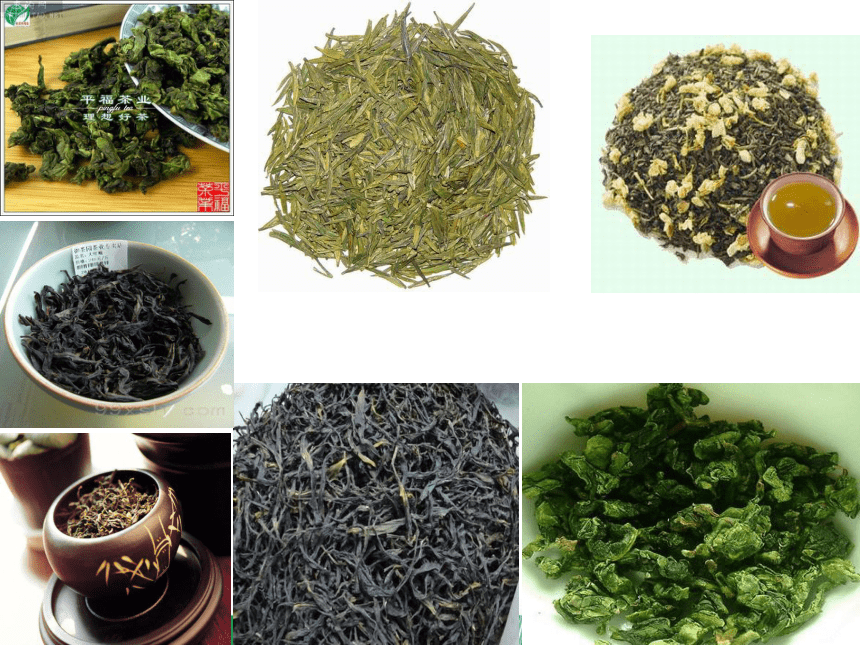 | |
| 格式 | zip | ||
| 文件大小 | 3.9MB | ||
| 资源类型 | 教案 | ||
| 版本资源 | 北师大版 | ||
| 科目 | 英语 | ||
| 更新时间 | 2019-07-05 21:35:03 | ||
图片预览

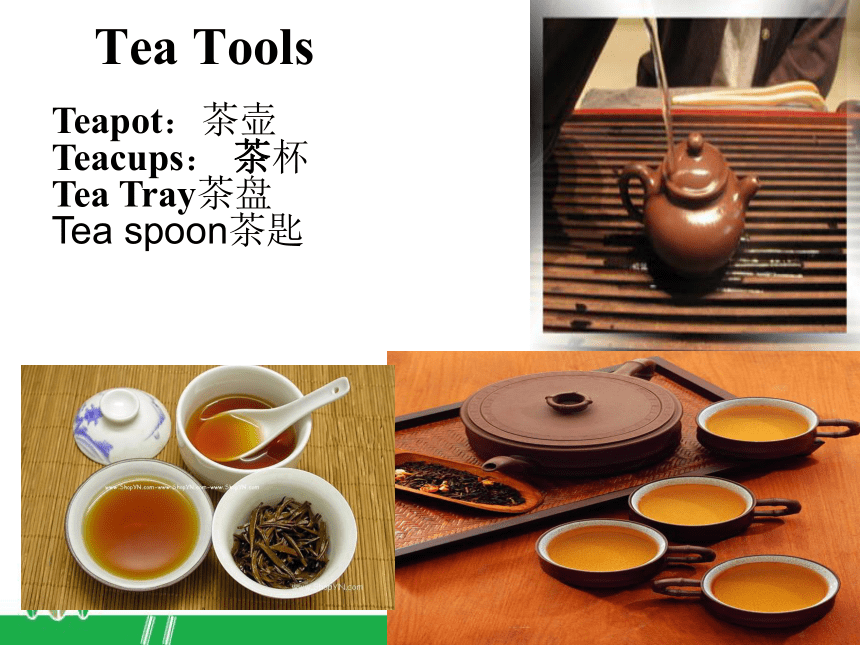
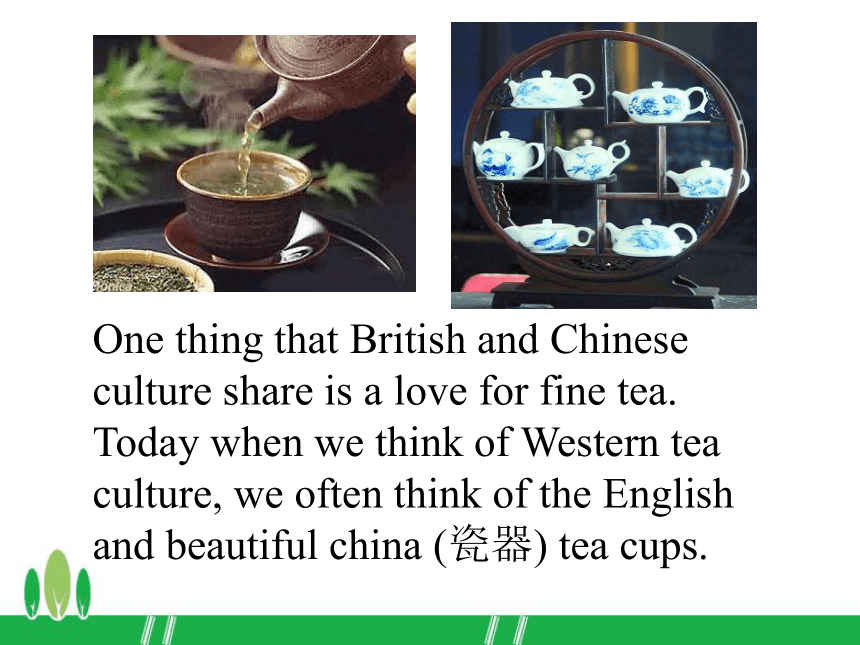
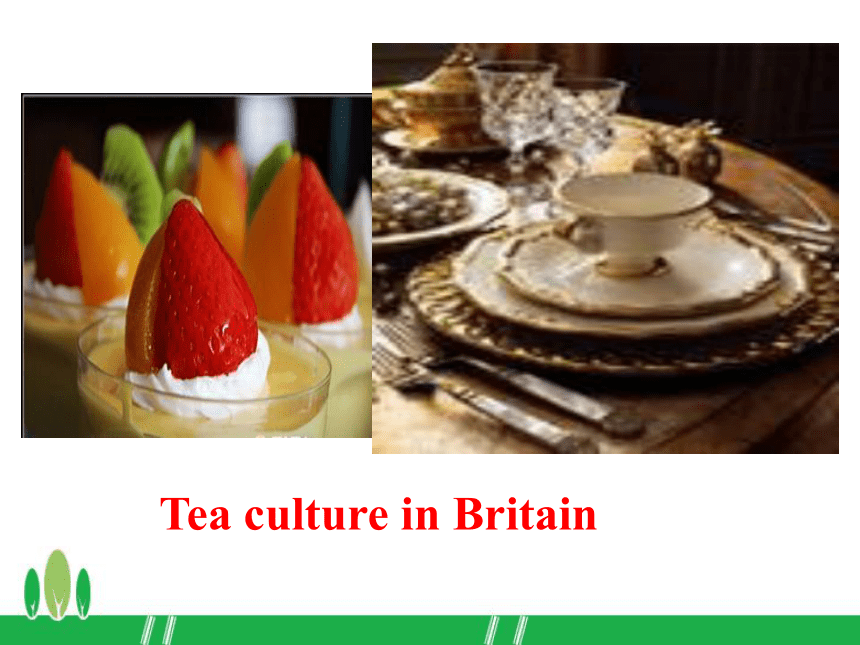

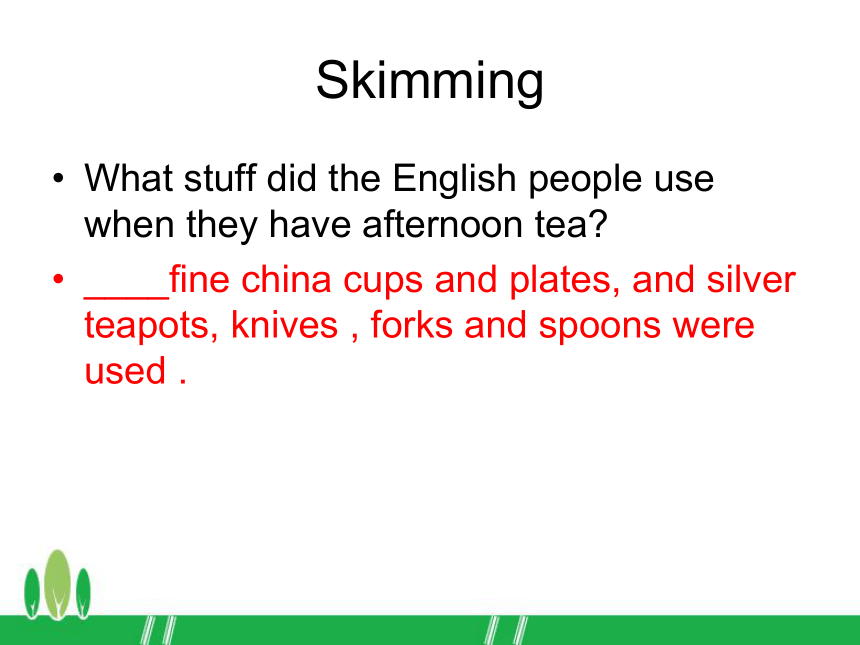
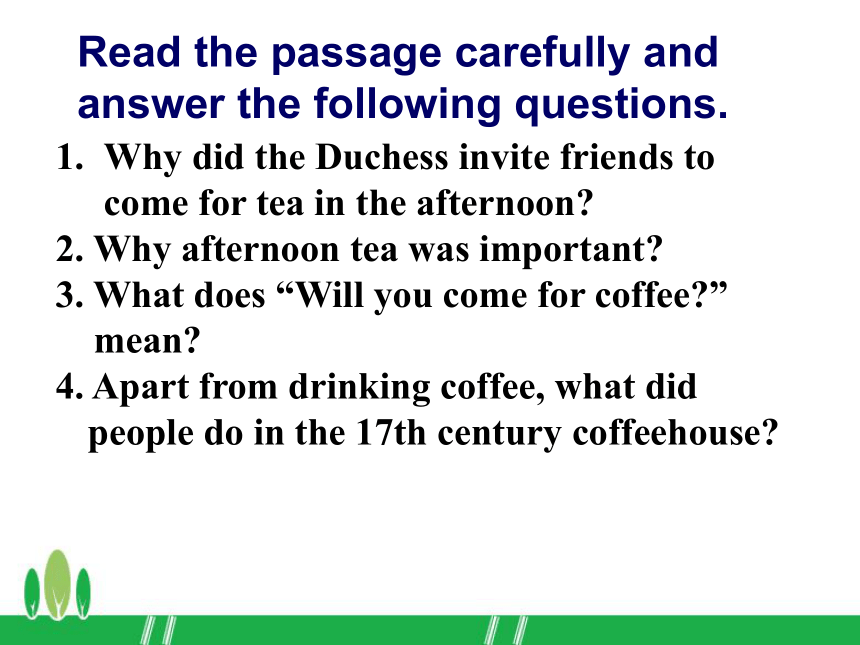
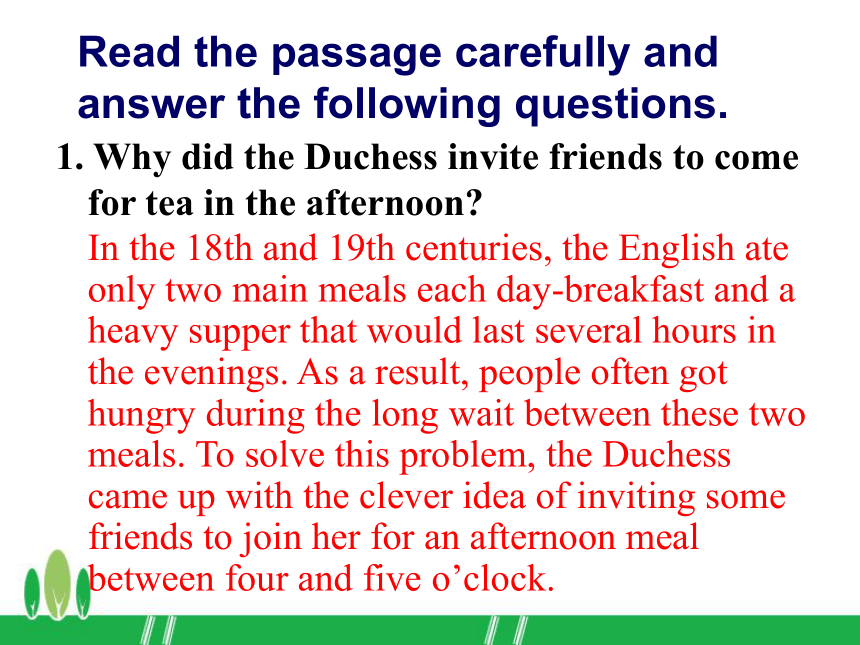
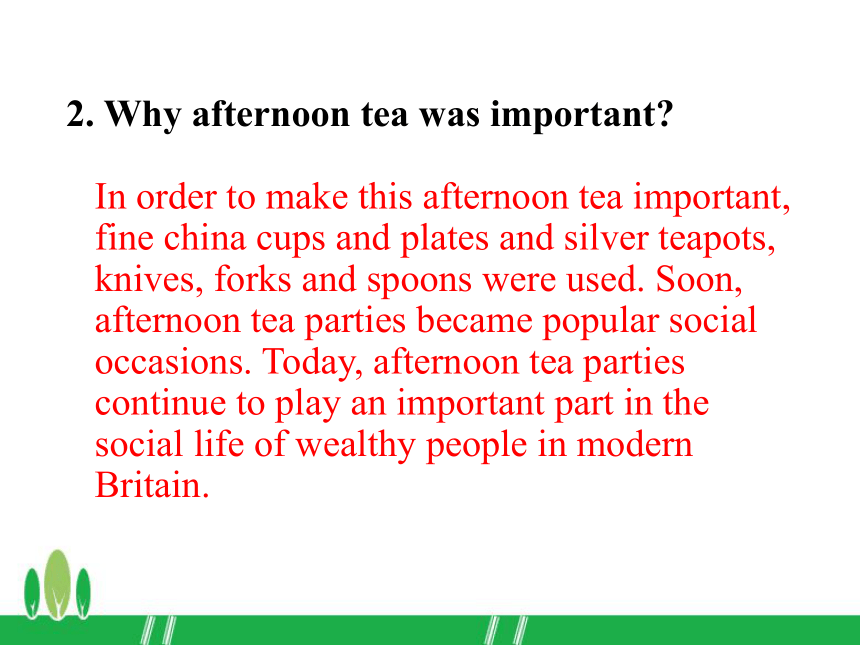
文档简介
课件23张PPT。Tea Tools Teapot:茶壶
Teacups: 茶杯
Tea Tray茶盘
Tea spoon茶匙One thing that British and Chinese culture share is a love for fine tea. Today when we think of Western tea culture, we often think of the English and beautiful china (瓷器) tea cups.Tea culture in BritainCoffee CultureSkimming What stuff did the English people use when they have afternoon tea?
____fine china cups and plates, and silver teapots, knives , forks and spoons were used . Read the passage carefully and answer the following questions.Why did the Duchess invite friends to come for tea in the afternoon?
2. Why afternoon tea was important?
3. What does “Will you come for coffee?”
mean?
4. Apart from drinking coffee, what did people do in the 17th century coffeehouse?
Read the passage carefully and answer the following questions.1. Why did the Duchess invite friends to come for tea in the afternoon?In the 18th and 19th centuries, the English ate
only two main meals each day-breakfast and a
heavy supper that would last several hours in
the evenings. As a result, people often got
hungry during the long wait between these two
meals. To solve this problem, the Duchess
came up with the clever idea of inviting some
friends to join her for an afternoon meal
between four and five o’clock.2. Why afternoon tea was important?In order to make this afternoon tea important,
fine china cups and plates and silver teapots,
knives, forks and spoons were used. Soon,
afternoon tea parties became popular social
occasions. Today, afternoon tea parties
continue to play an important part in the
social life of wealthy people in modern
Britain.3. What does “Will you come for coffee?”
mean?It means “Would you like to come to my
home for a chat?”4. Apart from drinking coffee, what did people do in the 17th century coffeehouse? In the 17th century, coffeehouse were busy
and noisy places where people like merchants
and bankers went to do their business as well
as to drink coffee.Language points1. love for 对……的爱,又如:
All of us have a love for our motherland.
我们每个人都热爱祖国。
Her love for him blinded her (to his faults).
她非常爱他以至 (对他的缺点) 丧失了判断力。
Her love for him never waved.
她对他的爱从未动摇过。2. as a result 结果;因此(独立作状语)
如:
The weather is dry. As a result, we have to water the vegetable garden.
天气干燥,因此,我们不得不给菜地浇水。
[拓展]
as a result of 由于;因为……的结果(后接名词或代词,做状语用)
result from 因……引起;起因于……
result in 导致;致使;造成……的结果用result构成的短语完成下列句子:
1. He was late the snow.
2. Stress and tiredness often a lack of attention.
3. He didn’t work hard, , he
failed his exam.
4. These problems past errors. [即时练习]as a result ofresult inas a resultresult from3. as well as 同……一样;也; 和
It is important for you as well as for me.
它对你我同样重要。
He grows flowers as well as vegetables.
他既种花也种蔬菜。
注意:
as well as连接两个名词作主语时,谓语动词的形式与前面的名词一致。如:
Peter as well as his friends likes listening to music.
Peter和他的朋友都喜欢听音乐。Chinese Tea CultureWhat do you know about tea in Chinese
culture?Discussionhistory, daily life, famous teas, offer tea to guests, beautiful china tea cups The History of Tea Drinking
Tea-drinking in China can be traced back to the Zhou Dynasty.
“Tea was discovered by Shen Nong and become popular as a drink in the state of Lu because of Zhou Gong.”
—Tea Classics
“茶之为饮,发乎神农氏,闻于鲁国公。”
—《茶经》Categories of TeaGreen tea
Black tea
Oolong tea
Yellow tea
White tea
Scented tea
Compressed teaFirewood, rice, oil, salt, sauce, vinegar and tea are the seven necessaries to begin a day.
早晨起来七件事,菜米油盐酱醋茶Eg:
A: well, I think tea is a very common drink in China and it has a long history.
B: Yes , you are right. Besides, drinking tea is good for health.
/ Sorry, but I don’t agree with you. I don’t like drinking tea. I prefer coffee because it tastes more delicious. Homework1. Write a short passage about Chinese tea culture
2. Surf the Internet and find more information about English Tea and Coffee Culture.Goodbye!
Teacups: 茶杯
Tea Tray茶盘
Tea spoon茶匙One thing that British and Chinese culture share is a love for fine tea. Today when we think of Western tea culture, we often think of the English and beautiful china (瓷器) tea cups.Tea culture in BritainCoffee CultureSkimming What stuff did the English people use when they have afternoon tea?
____fine china cups and plates, and silver teapots, knives , forks and spoons were used . Read the passage carefully and answer the following questions.Why did the Duchess invite friends to come for tea in the afternoon?
2. Why afternoon tea was important?
3. What does “Will you come for coffee?”
mean?
4. Apart from drinking coffee, what did people do in the 17th century coffeehouse?
Read the passage carefully and answer the following questions.1. Why did the Duchess invite friends to come for tea in the afternoon?In the 18th and 19th centuries, the English ate
only two main meals each day-breakfast and a
heavy supper that would last several hours in
the evenings. As a result, people often got
hungry during the long wait between these two
meals. To solve this problem, the Duchess
came up with the clever idea of inviting some
friends to join her for an afternoon meal
between four and five o’clock.2. Why afternoon tea was important?In order to make this afternoon tea important,
fine china cups and plates and silver teapots,
knives, forks and spoons were used. Soon,
afternoon tea parties became popular social
occasions. Today, afternoon tea parties
continue to play an important part in the
social life of wealthy people in modern
Britain.3. What does “Will you come for coffee?”
mean?It means “Would you like to come to my
home for a chat?”4. Apart from drinking coffee, what did people do in the 17th century coffeehouse? In the 17th century, coffeehouse were busy
and noisy places where people like merchants
and bankers went to do their business as well
as to drink coffee.Language points1. love for 对……的爱,又如:
All of us have a love for our motherland.
我们每个人都热爱祖国。
Her love for him blinded her (to his faults).
她非常爱他以至 (对他的缺点) 丧失了判断力。
Her love for him never waved.
她对他的爱从未动摇过。2. as a result 结果;因此(独立作状语)
如:
The weather is dry. As a result, we have to water the vegetable garden.
天气干燥,因此,我们不得不给菜地浇水。
[拓展]
as a result of 由于;因为……的结果(后接名词或代词,做状语用)
result from 因……引起;起因于……
result in 导致;致使;造成……的结果用result构成的短语完成下列句子:
1. He was late the snow.
2. Stress and tiredness often a lack of attention.
3. He didn’t work hard, , he
failed his exam.
4. These problems past errors. [即时练习]as a result ofresult inas a resultresult from3. as well as 同……一样;也; 和
It is important for you as well as for me.
它对你我同样重要。
He grows flowers as well as vegetables.
他既种花也种蔬菜。
注意:
as well as连接两个名词作主语时,谓语动词的形式与前面的名词一致。如:
Peter as well as his friends likes listening to music.
Peter和他的朋友都喜欢听音乐。Chinese Tea CultureWhat do you know about tea in Chinese
culture?Discussionhistory, daily life, famous teas, offer tea to guests, beautiful china tea cups The History of Tea Drinking
Tea-drinking in China can be traced back to the Zhou Dynasty.
“Tea was discovered by Shen Nong and become popular as a drink in the state of Lu because of Zhou Gong.”
—Tea Classics
“茶之为饮,发乎神农氏,闻于鲁国公。”
—《茶经》Categories of TeaGreen tea
Black tea
Oolong tea
Yellow tea
White tea
Scented tea
Compressed teaFirewood, rice, oil, salt, sauce, vinegar and tea are the seven necessaries to begin a day.
早晨起来七件事,菜米油盐酱醋茶Eg:
A: well, I think tea is a very common drink in China and it has a long history.
B: Yes , you are right. Besides, drinking tea is good for health.
/ Sorry, but I don’t agree with you. I don’t like drinking tea. I prefer coffee because it tastes more delicious. Homework1. Write a short passage about Chinese tea culture
2. Surf the Internet and find more information about English Tea and Coffee Culture.Goodbye!
